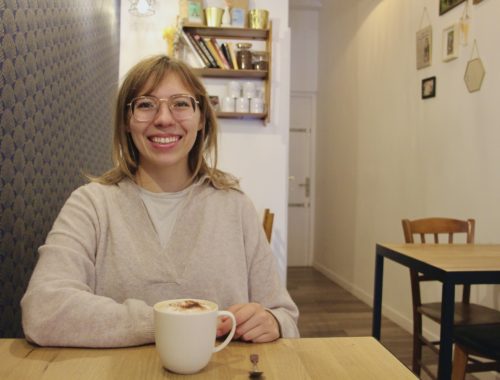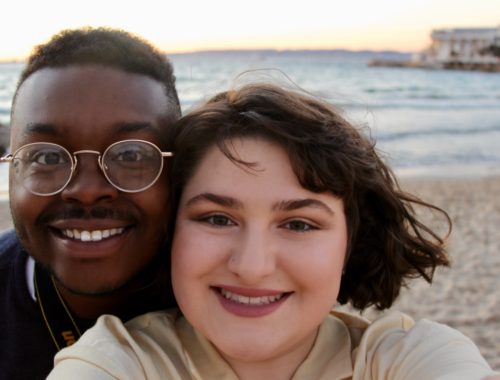
Five Ways TAPIF Made Us Successful in French Graduate School
The Teaching Assistant Program in France (TAPIF) is the American and Canadian section of the Assistants de langue en France program that gives young people the opportunity to teach English in France for an academic year. Many TAPIF participants use the program as a gap year between earning their undergraduate degrees and pursuing graduate education or entering the workforce. After graduating with our bachelor’s degrees in French and International Affairs in the spring of 2019, Jalen and I did just that! In the fall, we moved to France and worked as English assistants in Bar-sur-Aube and Troyes respectively during the 2019-2020 school year.
Though most people agree that TAPIF is a good time, it’s easy to underestimate the material value of working as an English assistant. Neither Jalen nor I were interested in teaching English as a career, the monthly stipend assistants receive is notoriously modest, and TAPIF is a fairly brief program in the grand scheme of things. So, is taking a gap year with TAPIF a waste of time?
As current master’s degree students in France, we are convinced that our time as English assistants with TAPIF has been integral to our achievements thus far. We believe that the program was the stepping stone we needed to make our dreams a reality. Read on to find out how participating in TAPIF has benefitted us as Americans in French law and business school.
1. Working in France improved our French-language skills.
Living and working in France naturally provides a setting conducive to improving your French-speaking skills. Though TAPIF assistants are expected to speak only English with their students in the classroom, there are plenty of opportunities to hone your French skills elsewhere. Chatting in French with English teachers before and after classes, spending time in the break room with staff members from other disciplines, and catching up with your students in the school courtyard are just a few examples of the numerous occasions we had to practice our French.
From lengthy presentations, to complex oral exams, to high-stakes internship interviews, our spoken French skills were undoubtedly one of the most important contributing factors to passing the first year of our master’s degrees. Without our advanced speaking abilities, partly developed during our year with TAPIF, we wouldn’t stand a chance as international students in a French university.
2. We got familiar with academic instruction à la française.
French and American education methods couldn’t be more different. Jalen and I learned this firsthand in our middle and high school classrooms as English assistants. In contrast to what we experienced growing up in the United States’ education system, we discovered that French educators are rather authoritarian, students’ grades are anything but a private affair, and much of the curriculum emphasizes rote memorization.
These revelations served us well during our the first year of our master’s degrees as we integrated into the French education system for the first time as adults. Though we certainly endured an adjustment period, understanding French teaching methods and expectations helped us to succeed in our studies, communicate appropriately with our professors, relate to our French classmates, and minimize any feelings of culture shock.
3. We had time to research the best graduate programs in France for us.
France’s robust higher education system boasts thousands of graduate-level degrees. Needless to say, wading through the metaphorical sea of options is extremely time consuming! English assistants only work 12-hour weeks and benefit from 8 weeks of paid vacation with TAPIF, which left us plenty of time to conduct in-depth research and single out the programs we hoped to attend.
Having this free time to pore over online resources such as Campus France’s master’s degree catalogue, “Trouver mon Master,” and individual university websites helped us decide exactly which programs would be the best fit for us. Furthermore, traveling around France during our vacations gave us the chance to investigate cities that we could have potentially lived in as students. This thorough research allowed us to uncover our top-choice programs, removed any uncertainties we may have had about them, and made us confident that we’d be excited to attend any one of the universities to which we applied.
4. Our experience made our graduate school applications stand out.
When it comes to applying to French university, every last detail about a candidate counts. Besides applying to programs that weren’t crafted specifically for international students, Jalen and I were also targeting programs that weren’t perfectly correlated with our undergraduate degrees. We therefore knew that endeavoring to study logistics and law in France would necessitate strong applications. Because French universities value relevant work experience and time spent in France, it was clear that including our TAPIF experience would be beneficial.
At first glance, teaching English doesn’t appear to be directly related to either of our current fields of study. However, upon closer investigation, TAPIF assistants’ work experience can be applicable to a number of diverse domains. For example, developing public speaking skills, practicing cross-cultural communication, and strengthening organizational skills are all abilities we fostered during TAPIF that demonstrated to universities that we were good candidates for their programs.
5. Our international student administrative tasks were cut in half.
Any foreigner who has resided in France is familiar with the laundry list of bureaucratic procedures that must be completed to establish oneself in the country. During TAPIF, secondary-level assistants are aided by their professeur référent, a teacher from one of their assigned schools that is meant to be their point of contact throughout the program, to complete some of these tasks. Furthermore, the 12-hour TAPIF work week gives assistants ample free time to set up appointments, make phone calls, and fill out the paperwork necessary to living in France without having to spread themselves too thin.
It was such a relief to have most of our administrative chores already finished when we arrived in Reims to begin our master’s degrees. We already had French bank accounts, French phone plans, French social security coverage, and French housing assistance accounts set up and active. This meant that we could use our time and effort to register for classes, secure an apartment, and prepare for the academic year instead of worrying about stressful paperwork and trying to fit bureaucratic rendez-vous into our full-time student schedules. The physical and mental energy we saved allowed us to start our master’s degrees off on the right foot.
Our year as English assistants with TAPIF was far from wasted time. Au contraire, it was a vital chapter of our life in France that helped us accomplish our goal of continuing our education abroad. Overall, TAPIF doesn’t have to start and end at having fun while teaching French students English – it can be a life-changing experience that will open a multitude of doors for anyone brave enough to give it a try.
Check out our video about why you should study in France!
You May Also Like

How to Teach English in France: Spotlight Interview with an Expert
January 19, 2022
What is Teaching in France Really Like? TAPIF Diary #5
March 25, 2020


2 Comments
Lisa Fleury
Excellent article. You are both great models for students. I would like to link it to our page about returning to France on vwpp.org
Jalen & Maria
We would be honored! Thank you for reading and supporting as always.